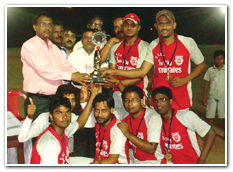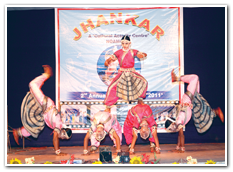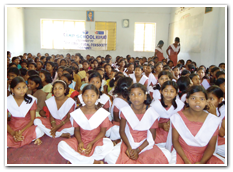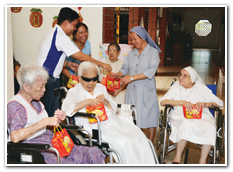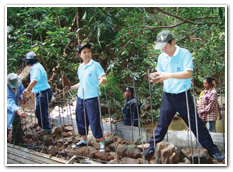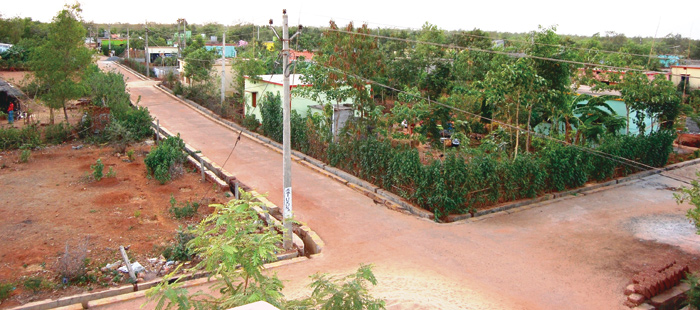| |
|
|
Tata Steel’s journey over the past century is a fascinating saga of pioneering
initiatives in steelmaking, responsible industrialisation with minimal impact on
the environment and the socio-economic empowerment of the community. |
|
Landmarks in community development |
|
21 June, 1915 – The first school, known as the KMPM School, was opened to bring about upliftment through education.
1 November, 1921 – Tata Steel's Jamshedpur Technical Institute opened with 23 students on roll.
1 March, 1958 – Jubilee Park was dedicated to the Nation to mark the Company’s 50th anniversary.
1958 – ‘Shramdaan’, a significant aspect of community development and social welfare, started in the bustees, around Jamshedpur.
1979 – Tata Steel Rural Development Society (TSRDS) was set up.The society began operation with an initial annual budget of  8.5 lakhs and a total of 32 villages in 1979. Today, the annual budget exceeding  5 crores caters to nearly 650 villages. |
|
|
|
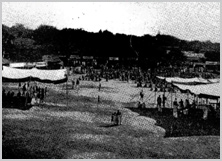
The Health and Industrial Exhibition
held in Jamshedpur in 1932.
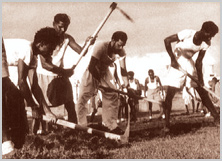
'Shramdaan' an aspect of social welfare
was introduced to the community in 1958.
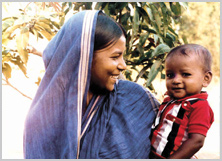
A mother and child after immunisation
at the Joda unit, Odisha
1915THE YEAR THE FIRST SCHOOL WAS ESTABLISHED IN JAMSHEDPUR. A LEGACY OF COMMUNITY SERVICE
As its operations have expanded to new geographies, the Tata Steel Group has retained a collective focus on various areas of corporate sustainability that impact people, the environment and society at large. Founded on the philosophy that society is not just another stakeholder, but the prime purpose of its business, the Company, across its various operations, is committed to making a positive contribution in a number of ways. The Company believes passionately that good corporate citizenship and good business performance go hand in hand and nurture each other through good times and bad.
LOOKING BACK WITH PRIDE
The policy of inclusive development is not just a policy on paper, but a value ingrained in the system through years of amalgamating social change with industrial progress. On 27th February, 1908, when the first stake was driven into the ground at Sakchi in Bihar, few would have guessed that just 20 years down the road this harsh, unrelenting land would become the site of one of India's most modern and ideal townships – Jamshedpur. A planned city, complete with wide roads, water, electricity and the best amenities in education, health care and basic infrastructure, Jamshedpur is India's best example
of a sustainable community created around an industry.
Before his death in 1904, the founder, Jamsetji Tata,
already had a vision in his mind of what this town
should look like. He told his son, Dorabji Tata:
“Be sure to lay wide streets planted with shady trees, every other of a quick-growing variety. Be sure that there is plenty of space for lawns and gardens. Reserve large areas for football, hockey and parks. Earmark areas for Hindu temples, Mohammedan mosques and Christian churches.”
In many ways, Jamshedpur went on to become a living manifestation of Tata Steel's community work. In 1915, Mrs. Perin, the wife of the consulting engineer at the Steel Works, started a primary school for children in the area. In 1916, a social welfare scheme was initiated by the Group to assist people in the areas of education, vocational training, family welfare and self-employment. In 1936, a night school was established in nearby Golmuri to help people who worked in the Company's factories. Today the Jamshedpur Utilities and Services Company (JUSCO) runs nine schools and one college in the city.
The Company's social outreach programme covers 600 villages in and around its manufacturing and raw materials units, through initiatives in the areas of income generation, health and medical care, education, sports, among others. Tata Steel is a founder member of the United Nations Global Compact and Jamshedpur became the first city in South East Asia to be chosen for the United Nations Global Compact Pilot Programme.
LOOKING FORWARD WITH HOPE The idea of inclusive development continues to drive the Company's Corporate Social Responsibility (CSR) activities. Just as it did at Jamshedpur, Tata Steel is developing model townships like Trijanga, Sansailo and Gobarghati, close to the Company's Greenfield Project at Kalinganagar in Odisha. Infrastructure development continues to grow in the states of Odisha, Chhattisgarh and Jharkhand, where many of the Group’s operating units in India are based.
A CONTINUED FOCUS ON HEALTH CARE With emphasis on improving the health and welfare of employees and local communities, the programmes conducted by the Group focus on adolescent health and HIV / AIDS awareness. In South East Asia, NatSteel has a comprehensive programme of health screening for employees and their families. This programme also creates awareness on lifestyle diseases among the community.
Mother and child health
The concept of a healthy mother and a healthy baby is one of the cornerstones of Tata Steel’s health care programmes. Through investments in maternal and neonatal programmes, the Group has helped improve the health of thousands of women and children each year.
The hospital on rails continues its journey
The Lifeline Express – the world’s first hospital on rails – offers medical services such as on-the-spot diagnosis, medication and advanced surgical treatment for orthopaedic, ear, nose, throat and eye ailments. In a recently concluded camp, conducted at the Jajpur Road Railway in Odisha, the Lifeline Express gave services to 4,309 physically challenged people from the districts of Keonjhar, Bhadrak, Dhankanal, Jajpur and Cuttack in Odisha.
Strengthening the future
The most common threats to growing children often arise from lack of nutrition and hygiene. To control these problems, the Tata Steel Rural Development Society has been conducting regular health checks in schools and providing children with necessary medicines free of cost.
Drug and alcohol abuse
In an effort to battle the high rate of drug and alcohol abuse in the towns of Port Talbot and Newport in South Wales, Tata Steel has joined forces with various organisations like the Gwent Alcohol Project, the West Glamorgan Council on Alcohol and Drug Abuse, the Community Union and key contractors. The Group has also raised funds for the development of community centres which could help young children stay away from drugs.
EDUCATION Tata Steel believes that education is a basic human right that must be provided to all. This vision is the force behind the Group’s involvement in a number of educational programmes around the world. |
| |
The promise of a bright future |
|
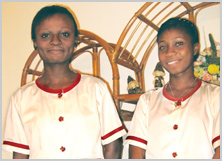 Tata Steel has always endeavoured to promote higher education and vocational training. It was this intention that drove a tie-up between Tata Steel Cote d’Ivoire (TSCI) and Yarani, a vocational training institute for girls in Abidjan where TSCI would provide scholarships for the education of students. This tie-up saw two bright students from the nearby town of Bongola being selected for a management programme in hospitality with a specialisation in baking and cooking. Tata Steel has always endeavoured to promote higher education and vocational training. It was this intention that drove a tie-up between Tata Steel Cote d’Ivoire (TSCI) and Yarani, a vocational training institute for girls in Abidjan where TSCI would provide scholarships for the education of students. This tie-up saw two bright students from the nearby town of Bongola being selected for a management programme in hospitality with a specialisation in baking and cooking.
|
|
 |
|
| |
In India, the Group provides financial support to students at the primary and secondary school level, as well as scholarships for higher education. Through scholarships such as the Jyoti Fellowship and the Moodie Endowment, Tata Steel supports the education and development of students in the states of Jharkhand and West Bengal as well as of children from the Scheduled Castes and Scheduled Tribes. The Group’s Tribal Cultural Society also provides coaching to students to prepare for a variety of vocational examinations.
In South Africa the group has pledged R50,000 (US $5,275) for a period of three years to Brackenham primary school to help parents who are unable to pay school tuition fees. In the poor rural area of Mandlanzini, Tata Steel has sponsored the school fees for 50 orphans and provided administrative support to a primary school.
In Thailand, the Tata Steel initiative ‘Grow Smart with Tata Steel’ has continued to prosper. The initiative aims to promote self-learning and development in youngsters living in remote areas by nurturing their interest in reading, and expanding their knowledge and capabilities.
NatSteel, along with the NatSteel Employees Union, holds a joint merit awards presentation. Since the inception of this award in 1991, nearly 1,000 recipients have received more than S $500,000 in awards that support education.
COMMUNITY DEVELOPMENT
Ensuring inclusive growth for all its stakeholders is one of the key cornerstones of Tata Steel’s values. It is this vision that manifests itself in a focus on providing rural services in the hinterland around Jamshedpur and in Odisha where the Company’s mines, collieries and greenfield projects are based. This intervention is undertaken by four organisations: The Tata Steel Rural Development Society (TSRDS), the Tribal Cultural Society (TCS), the Tata Steel Family Initiatives Foundation (TSFIF) and Urban Services. |
| |
|
|
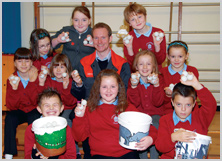 Chris O’Brien grew up in Port Talbot and often wondered about the impact of the steel plant on the environment. After gaining a degree in marine biology, O’Brien joined Tata Steel in 2007 as a graduate environment engineer and has since played an active role in spreading awareness about carbon emissions in the community. O’Brien runs workshops for local primary schools where he imparts environmental awareness. Chris O’Brien grew up in Port Talbot and often wondered about the impact of the steel plant on the environment. After gaining a degree in marine biology, O’Brien joined Tata Steel in 2007 as a graduate environment engineer and has since played an active role in spreading awareness about carbon emissions in the community. O’Brien runs workshops for local primary schools where he imparts environmental awareness.
|
|
 |
|
| |
In South East Asia, NatSteel is actively involved in community work and corporate philanthropy in the countries in which it operates. Its ‘Building Beyond Borders’ CSR programme focuses on supporting the underprivileged elderly as well as the education of disadvantaged youth. In Singapore, regular engagement with the Company’s three adopted charities raised staff volunteering rates to over 30% last year, compared to 22% the year before. The charities that are supported work with elderly people, disadvantaged youth and physically challenged people.
At the NatSteel subsidiaries in Australia, China and Vietnam, CSR activities include granting bursary awards, engagement with local schools as well as disaster relief work.Tata Steel Thailand also actively participated in disaster relief work last year, distributing supplies to people affected by the flooding near its SISCO plant.
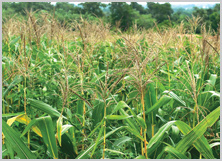
Wasteland development – Maize cultivation
at Seraikela-Kharsawan district, Jharkhand.
Sustainable livelihood through wasteland development:
Another strand of the work Tata Steel does with rural communities focuses on strengthening agricultural capabilities. Aid is offered to farmers to increase productivity and to bring wastelands under cultivation. A large portion of India’s land falls under the category of wasteland. To better utilise this land, Tata Steel has been partnering the National Horticultural Mission since 2005. By 2009-10, almost 9,000 acres of land had been brought under cashew and mango plantations, benefiting 3,700 households from 129 villages in the East Singhbhum district of Jharkhand. At the Joda East Iron Mine in Odisha, Tata Steel has also introduced a scientific rainwater harvesting system to check the depleting levels of ground water. A large storage-cum-percolation lake has been constructed at a favourable location to pool in the water from the vast catchment area around the lake. This project will help increase the ground water levels of surrounding settlements, including the Joda township.
Self-help groups for women:
Self-help groups (SHGs) formed by rural women have been effective agents of change in rural areas. Empowerment initiatives have raised the skill levels of rural women, enabling rural households to benefit from additional income sources. While the SHGs get financial assistance from government departments and banks, Tata Steel's support is both financial and technical. The Company often partners with professional groups to assist women in starting their own businesses.
Employability training:
Apart from a strong focus on primary and secondary education, the Tata Steel Group has actively supported employability or vocational training. The initiative aims at developing skills among communities, women and young people, supporting local artisans to provide them with better opportunities to compete in the job market. Joboriented training programmes are regularly conducted in many centres in India, Africa and South East Asia. |
| |
|
|
 A wholly-owned subsidiary of Tata Steel, UK Steel Enterprise Limited (UKSE) was established in 1975 with the purpose of improving the economies of those areas of the United Kingdom that are most affected by changes in the steel industry. It has fulfilled its aim, creating nearly 70,000 new jobs and supporting more than 4,500 small businesses. UKSE delivered a package of support measures in the wake of job losses at Teesside, including grant and loan funding for more than 100 new businesses in the region, and an expansion of the innovation centre at Hartlepool's Queens Meadow Business Park. Additional funding has been provided to a variety of businesses across all steel areas of the UK to help create new job opportunities in steel communities. A wholly-owned subsidiary of Tata Steel, UK Steel Enterprise Limited (UKSE) was established in 1975 with the purpose of improving the economies of those areas of the United Kingdom that are most affected by changes in the steel industry. It has fulfilled its aim, creating nearly 70,000 new jobs and supporting more than 4,500 small businesses. UKSE delivered a package of support measures in the wake of job losses at Teesside, including grant and loan funding for more than 100 new businesses in the region, and an expansion of the innovation centre at Hartlepool's Queens Meadow Business Park. Additional funding has been provided to a variety of businesses across all steel areas of the UK to help create new job opportunities in steel communities.
|
|
|
|
| |
|
|
ONE STEP CLOSER TO A DREAM
A simple husking machine was all it took for the smiles to return to the faces of Sukanti Murmu and her husband, Shyamsundar. Sukanti, is a member of the Hirla Marang Buru Self-Help Group (SHG) in Tangiriapal, Keonjhar, Odisha. Sukanti purchased a husking machine with the help of her SHG. Her small venture, which started in a makeshift shed, is just one small success story. She works at the machine along with her husband and the two have managed to pay off their loan, and also ensured that they have a steady income stream every month.
REARING A LIVELIHOOD
The idea of a self-help group in the small village of Badeparoda, Chhattisgarh initially met with a little hesitation. In 2010, however, a group of women, decided to create their own SHG, focused on goat-rearing, with support from the TSRDS. A year later, the group's activities have expanded. They now look after 10 animals and make revenues of  30,000. Their success is encouraging other women to come forward and form self-help groups in the region. |
| |
HOPE TAKING ROOT
Two women’s SHGs in Bichakundi and Joda in Odisha are finding success the green way. The groups have been growing saplings for the last three years according to the requirements of the Tata Steel plantation in the area. Every year, the groups grow around 100,000 saplings. This profitable activity helped them earn  4.5 lakhs in profit. The groups are now looking to expand their initiatives into vermi-compost production.
|
|
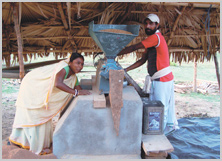
Sukanti Murmu and her husband
Shyamsundar work on their husking machine.
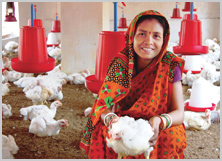
The poultry units of Kalinganagar are helping
farmers gain an alternate source of income.
|
POULTRY UNITS AT KALINGANAGAR
As part of its many activities aimed at generating alternative income for the people of Kalinganagar, the Company has helped enable the establishment of poultry units. Last year, 11 farmers undertook poultry farming after receiving advice and support in poultry farm management. In just one year, the group achieved a turnover of  14.7 lakhs with a net profit of  86,003.
|
|
|
|
|
SNAPSHOTS OF COMMUNITY ACTIVITIES |
|
Promoting tourism in Chhattisgarh
Tata Steel participated in the Chitrakoot festival held in the Bastar district of Chhattisgarh. The festival, which promotes tourism in the state, also hosted a sports event. The Company supported the tournament as part of its policy to encourage local talent.
Lending a hand of support
Tata Steel Thailand supported several disaster relief projects during the year. The Company distributed a disaster relief package for flood victims in the vicinity of its SISCO plant. The Company also donated funds to the Embassy of Japan in Thailand in the wake of the tragic earthquake and tsunami in Japan.
Bonding over sport
The Sukinda Chromite Mine in Odisha organised
a week-long, day-night cricket tournament. Teams
from neighbouring areas such as Kankadapal,
Ransol, Jajpur, Sansailo, OMC Kaliapani, Kuhika and
Tata Mines participated in the tournament.
A mark of respect
As part of its initiative to promote local culture in
Thailand, the Company donated the customary
'Khatin’ offering to Buddhist monks. The donations
comprised robes and essential materials. The
Company also supports monasteries by donating
construction materials to build temples and schools.
Celebrating tradition
The Ores, Mines and Quarries division of Tata Steel was a
major part of the Jhankar Cultural Institution’s celebrations
this year. The acrobatic dance nuances of the Gotipua
dancers – boys in the age group of 15-16 years – captivated
the audience at this popular event.
Infrastructure development
The TSRDS undertook infrastructure development projects in the Kotpali and Nayagarh villages of Joda, Odisha. These included the reconstruction of a check dam and the development of a school.
Getting back on the road to learning
Respecting the basic rights to education and learning of
every individual, Tata Steel's CSR activities at Noamundi
include a unique education camp. This camp for girls is a
bridge course that helps students who dropped out of school
complete their education. The girls are tutored and then
moved to mainstream education in the form of local schools.
As many as 200 students have benefited from this camp.
|
A heart-warming celebration
As part of its CSR programme, 25 NatSteel volunteers
celebrated the New Year with residents of the Saint
Joseph's Home, one of the charities supported by
the Company. The volunteers put up song and dance
performances and the residents welcomed the New Year
with goodie bags made specially for the occasion.
Support for indigenous cultures
Tata Steel organised a traditional folk dance competition
in Sansailo, Odisha. Thirty-five groups from the villages
of Danagadu, Sukinda and Bamnipal participated in this
colourful event.
A strong partnership
NatSteel continues its strong support for the Society of
the Physically Disabled (SPD) by awarding S $90,000 to
129 students with physical disabilities or with physically-challenged
parents. The SPD is also a part of NatSteel's
'Building Beyond Borders' initiative.
Apprenticeships at Scunthorpe
The Tata Steel site in Scunthorpe will offer 63 apprenticeships
within the Company to a group of teenagers from schools
and colleges in North Lincolnshire this summer. The
apprentices will specialise in structural, mechanical and
electrical engineering and chemistry and metallurgy. The
apprenticeship programme, extending over three years, will
train youngsters in every aspect of the industry.
|
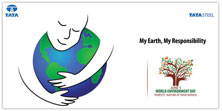
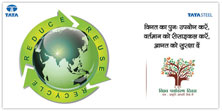
Apart from working with communities to address
environmental and social issues, Tata Steel also creates
awareness through advertising campaigns. The
Company has tied up with mass media to promote
messages on occasions like the World Environment Day. |
|
|
Going green
Environmental projects are also a key feature of the
Company's CSR activities. Tata Steel Thailand has helped
build temporary and permanent dams at the Ang Rue Nai
Wildlife Sanctuary. The Company also donated steel for a
coral cultivation project in conjunction with the Iron and
Steel Institute of Thailand.
|
|
|
|
BUILDING A MODEL LIFE: KALINGANAGAR
Trijanga township:
Apart from its CSR work in and around Jamshedpur, the Company's activities touch the lives of people in more than 800 villages in Jharkhand, Odisha and Chhattisgarh. From the early stages of a project's planning, the Tata Steel Parivar (Family) organisation engages with local communities to discuss their expectations and needs. The Trijanga township is a case in point.
All-weather roads, uninterrupted power supply, piped water and planned layouts are advantages that are lacking in most towns and cities in India. However, the Trijanga township in Jajpur, Odisha has all of these benefits. Established by the Tata Steel Parivar, the Trijanga, Sansailo and Gobarghati townships were built for families displaced by the Kalinganagar greenfield steel project. Each relocated family has been given a plot of land measuring 0.1 acres and funding for the construction of a house. They have also been given employment.
The children of these families are offered assistance in higher education through scholarships funded by Tata Steel Parivar. To date, 39 children have benefited from these scholarships.
Here are some of the initiatives that the TSRDS and the Company have undertaken in the vicinity of the Kalinganagar greenfield project:
1. HEALTH: Medicated mosquito nets were distributed to students of residential schools and to villagers under the Malaria Eradication Programme. Students of five tribal residential schools were also given free check-ups and medicines. The Company also distributed essential items like mattresses and pillows to tribal residential schools.
2. EMPOWERMENT: The Tejaswini Programme organised by the Company has contributed to the empowerment of more than 1,000 women belonging to 70 Self-Help Groups across 40 villages.
3.YOUTH ENGAGEMENT: Tata Steel has been organising the Pragati Inter-Village Football League for the last two years. This year, 64 teams from 50 local villages participated in the tournament. This is one of the many methods used to identify and nurture local sporting talent. Tata Steel's Sports Feeder Centre (SFC), set up in 2008, at Duburi, Jajpur, also promotes sports in the rural and urban areas of Odisha. More than 320 budding sporting talents in football and archery have been groomed at the Centre. |
Roads, electricity and potable water are just some of the amenities that the residents of the Trijanga township enjoy.
|
| |
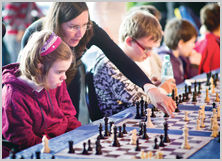
The Tata Steel Chess Tournament
2011 at the Netherlands.
35THE NUMBER OF GRANDMASTERS
WHO PARTICIPATED
IN THE TATA STEEL CHESS TOURNAMENT.

The Triathlon is one of the key
sporting events supported by TSE.
THE SPORTING WAY
Tata Steel believes that sport is an ideal platform for engaging youth and one of the key factors in developing well-rounded leaders in the industry. It is with this viewpoint that the Company supports a wide range of cultural, social, educational and sporting activities that benefit the Group's communities and society at large.
The Company supports sport through its sponsorship of sporting events, the establishment of sporting academies, support for athletes and the creation of necessary infrastructure such as playgrounds and stadiums. Here are some of the Company's key initiatives in the sporting arena:
-
The Tata Football Academy and the Tata Archery Academy provide state-of-the-art assistance to budding footballers and archers from across India. The Tata Football Academy has an outstanding record of producing quality players who have gone on to represent India.
-
Encouraging indigenous sport has always been a part of the Company's CSR policy. In India, Tata Steel has organised and supported many rural sport events, which have encouraged the emergence of local sporting talent. The Company also organises various porting competitions within its operating units.
-
The annual Tata Steel Chess Tournament: Held in Wijk aan Zee in the Netherlands, this tournament is one of the world's leading chess tournaments, attracting players and fans from all over the world. Over 40 world-ranked players, including 35 grandmasters, participated in the tournament in January 2011.
-
Tata Steel Europe has been supporting the British Paratriathlon Championships since its inception three years ago. The Company is also the corporate partner of the British Triathlon Federation and plays an important role in creating interest and awareness around the triathlon. The Company has also been encouraging the participation of young children in the sport.
|
|
|
|
 Chris O’Brien grew up in Port Talbot and often wondered about the impact of the steel plant on the environment. After gaining a degree in marine biology, O’Brien joined Tata Steel in 2007 as a graduate environment engineer and has since played an active role in spreading awareness about carbon emissions in the community. O’Brien runs workshops for local primary schools where he imparts environmental awareness.
Chris O’Brien grew up in Port Talbot and often wondered about the impact of the steel plant on the environment. After gaining a degree in marine biology, O’Brien joined Tata Steel in 2007 as a graduate environment engineer and has since played an active role in spreading awareness about carbon emissions in the community. O’Brien runs workshops for local primary schools where he imparts environmental awareness.




 Tata Steel has always endeavoured to promote higher education and vocational training. It was this intention that drove a tie-up between Tata Steel Cote d’Ivoire (TSCI) and Yarani, a vocational training institute for girls in Abidjan where TSCI would provide scholarships for the education of students. This tie-up saw two bright students from the nearby town of Bongola being selected for a management programme in hospitality with a specialisation in baking and cooking.
Tata Steel has always endeavoured to promote higher education and vocational training. It was this intention that drove a tie-up between Tata Steel Cote d’Ivoire (TSCI) and Yarani, a vocational training institute for girls in Abidjan where TSCI would provide scholarships for the education of students. This tie-up saw two bright students from the nearby town of Bongola being selected for a management programme in hospitality with a specialisation in baking and cooking.
 A wholly-owned subsidiary of Tata Steel, UK Steel Enterprise Limited (UKSE) was established in 1975 with the purpose of improving the economies of those areas of the United Kingdom that are most affected by changes in the steel industry. It has fulfilled its aim, creating nearly 70,000 new jobs and supporting more than 4,500 small businesses. UKSE delivered a package of support measures in the wake of job losses at Teesside, including grant and loan funding for more than 100 new businesses in the region, and an expansion of the innovation centre at Hartlepool's Queens Meadow Business Park. Additional funding has been provided to a variety of businesses across all steel areas of the UK to help create new job opportunities in steel communities.
A wholly-owned subsidiary of Tata Steel, UK Steel Enterprise Limited (UKSE) was established in 1975 with the purpose of improving the economies of those areas of the United Kingdom that are most affected by changes in the steel industry. It has fulfilled its aim, creating nearly 70,000 new jobs and supporting more than 4,500 small businesses. UKSE delivered a package of support measures in the wake of job losses at Teesside, including grant and loan funding for more than 100 new businesses in the region, and an expansion of the innovation centre at Hartlepool's Queens Meadow Business Park. Additional funding has been provided to a variety of businesses across all steel areas of the UK to help create new job opportunities in steel communities.

